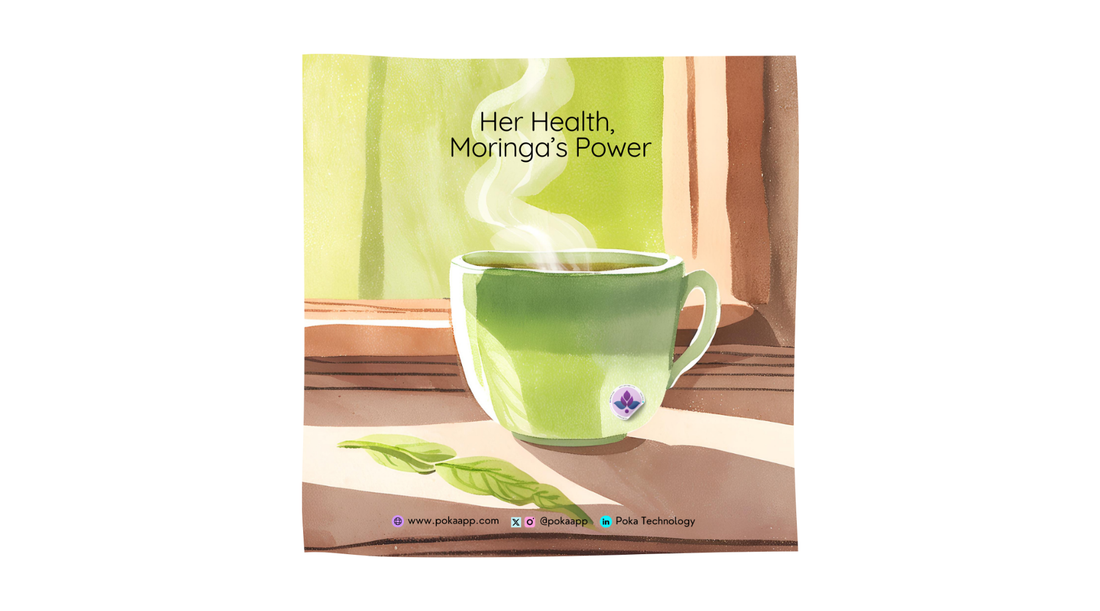
Her Health, Moringa’s Power
Share
Written by: Glorious Kate Akpegah, Poka Library Contributor
Edited by: Adel Tipora, Creative Strategist, Poka
Forget pearls and diamonds, a girl's bestie is a cup of healthy tea, particularly one steeped in moringa’s power. Teas have been known for centuries to offer a plethora of benefits, from weight management to stress relief and skin health, depending on the main ingredient. In this article, we’ll explore the possibilities of moringa, a key ingredient in Yaye’s Vigorous Tea, now available on Poka Market.
Moringa, scientifically known as moringa oleifera, is often referred to as the "wonder tree" or “drumstick tree”. Numerous scientific studies prove that all parts of the moringa tree including the leaf, pod, bark, gum, flower, seed, seed oil, and root offer some medicinal benefit. Let’s spill the tea on how moringa can be used in particular, to support women’s health!
Moringa for Women's Health
Menstrual health
Moringa contributes to menstrual health by relieving menstrual pain, also known as dysmenorrhoea. A 2022 study in the International Journal of Research in Medical Sciences done among adolescent girls showed that moringa leaf soup effectively improved dysmenorrhea as well as other menstrual symptoms. The study also revealed that this wonder tree corrected anemia in the participants by increasing their red blood cell levels.
Hormonal Balance
With age comes fluctuations in some hormones in the female body. However, by sipping moringa tea, you may be able to regulate or balance your hormones. A 2022 study revealed that moringa leaves may help lower insulin and blood sugar levels, reduce inflammation, and balance hormone levels in women with polycystic ovary syndrome (PCOS). Another study shows that moringa can act like estrogen, the hormone that helps regulate the menstrual cycle or block its effects. It can also act like progesterone, another important hormone that regulates menstrual cycle and maintains pregnancy.
Antioxidant Benefits
Research shows that moringa has antioxidant properties and therapeutic potential for preventing health problems after menopause. These antioxidants include retinol (Vitamin A), ascorbic acid (Vitamin C), glutathione peroxidase, and superoxide dismutase. When the body experiences oxidative stress and not enough antioxidants, it can cause problems with female reproductive health, potentially leading to gynecological diseases and even infertility. Antioxidants are important because they help maintain healthy reproductive function. They support the development of eggs, help the uterine lining mature, and regulate hormone levels that affect blood flow.
Additionally, antioxidants are beneficial for skin health by protecting against UV damage, preventing collagen breakdown, reducing inflammation, and brightening skin tone. They enhance skin barrier function and provide anti-aging benefits by neutralizing free radicals and preventing environmental damage to you that feminine glow.
Increased Lactation
For lactating women, moringa can help in breast milk production. This was demonstrated by a study done among postpartum women where moringa was found to increase the volume of breast milk. Additionally, no side effects were noticed in either nursing mothers or their babies who used moringa in the study.
A Wealth of Wellness Awaits
Moringa didn’t earn its "wonder tree" nickname just for the bragging rights. It indeed does wonders that extend beyond women's health. Other benefits, as evidenced by science, include healthy heart and liver protection, anti-inflammatory activity, weight management, antimicrobial activity, wound healing, analgesic effects, etc. If you have any medical conditions or concerns about using moringa, don't hesitate to seek the advice of your physician to know what is ideal for you.
Interested in savoring the taste of moringa and experiencing its amazing health benefits. Join the Vigorous Tea party and waltz your way to wellness!
References:
https://www.msjonline.org/index.php/ijrms/article/download/10745/7138
https://www.ncbi.nlm.nih.gov/pmc/articles/PMC9595062/
https://pubmed.ncbi.nlm.nih.gov/3352285/
https://pubmed.ncbi.nlm.nih.gov/26396347/
